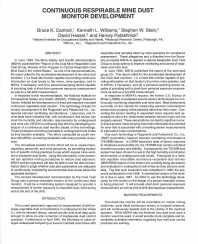Mining Publication: Continuous Respirable Mine Dust Monitor Development
Original creation date: February 1997
In June 1992, the Mine Safety and Health Administration (MSHA) published the "Report of the Coal Mine Respirable Dust Task Group, Review of the Program to Control Respirable Coal Mine Dust in the United States." As one of its recommendations, the report called for the accelerated development of two mine dust monitors: (1) a fixed-site monitor capable of providing continuous information on dust levels to the miner, mine operator, and to MSHA, if necessary, and (2) a personal sampling device capable of providing both a short-term personal exposure measurement as well as a full-shift measurement. In response to this recommendation, the National Institute for Occupational Safety and Health (NIOSH), Pittsburgh Research Center, initiated the development of a fixed-site machine-mounted continuous respirable dust monitor. The technology chosen for monitor development is the Rupprecht and Patashnick Co., Inc. tapered element oscillating microbalance. Laboratory and in-mine tests have indicated that, with modification, this sensor can meet the humidity and vibration requirements for underground coal mine use. NIOSH is continuing that effort by developing prototypes of a continuous dust monitor based on this technology. These prototypes are being evaluated in underground coal mines as they become available. This effort, conducted as a joint venture with MSHA, is nearing completion with every promise of success. The immediate benefit of this effort will be the researchers, regulatory personnel, and mine personnel, by permitting evaluation of specific mining practices to see which expose mine workers to excessive dust levels. Using this information, mine personnel can optimize mining procedures to reduce dust exposure. MSHA and the operators will also be able to use the dust concentration data to judge whether dust plan parameters are adequate to continuously maintaining environmental dust levels below the applicable standard. The second development recommended by the Dust Task Group was a person-wearable version of the continuous dust monitor. It will be a monitoring system designed to provide a measurement of worker exposure to respirable dust, both during and at the end of the shift.
Authors: BK Cantrell, KL Williams, SW Stein, D Hassel, H Patashnick
Conference Paper - February 1997
NIOSHTIC2 Number: 20027787
Proceedings of the 6th International Mine Ventilation Congress (May 17-22, 1997, Pittsburgh, Pennsylvania). Chapter 2, Ramani RV, ed., Littleton, CO: Society for Mining, Metallurgy, and Exploration, Inc., 1997 Feb; :11-17
See Also
- Continuous Respirable Mine Dust Monitor Development
- Equivalency of a Personal Dust Monitor to the Current United States Coal Mine Respirable Dust Sampler
- Evaluation of the Approach to Respirable Quartz Exposure Control in U.S. Coal Mines
- Laboratory and Field Performance of a Continuously Measuring Personal Respirable Dust Monitor
- Laboratory Evaluation of Pressure Differential-based Respirable Dust Detector Tube
- Miners' Views about Personal Dust Monitors
- Miners' Views About Personal Dust Monitors
- NIOSH Research in Coal Dust and Explosions
- Performance of a New Personal Respirable Dust Monitor for Mine Use
- Respirable Quartz Hazard Associated with Coal Mine Roof Bolter Dust
- Page last reviewed: 9/21/2012
- Page last updated: 9/21/2012
- Content source: National Institute for Occupational Safety and Health, Mining Program


 ShareCompartir
ShareCompartir
